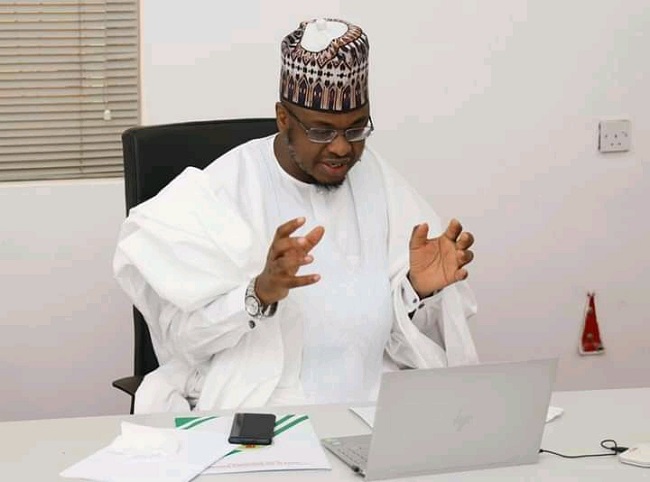The Chairman Senate Committee on ICT and cybersecurity, Senator Oseni Yakubu has urged the Minister of Communications and Digital Economy, Dr Isa Pantami to create more awareness of the recently enacted Startup Act.
Senator Yakubu gave the charge at the opening ceremony of the Digital Nigeria Conference 2022, organised by the National Information Technology Development Agency (NITDA), on Tuesday in Abuja.
The Lawmaker said though he has been doing it on his own beat the ministry need to do more.
“The Ministry of Communications and Digital Economy should create more awareness of the Startup Act for Nigerian youths to know the benefits and opportunities that abound with it.
“We are going to collaborate with the minister of Communication and Digital Economy to create this awareness and I’ve been doing my little bit to create awareness of the potential of the bills. I trust Nigerian youths they are very intelligent and talented and I am sure they will key into it . And also contribute their quota to the GDP and placing Nigeria in the ICT world map.”
Speaking on the Memorandum of Understanding(MoU) the Nigerian government signed with Microsoft to train 5 million Nigerians, the senator said with the Act, jobs are already waiting for them.
“The five million young people that we are talking about are going to be trained by Microsoft. The jobs are already there, awaiting the youth to key in.
“When Mr President signed the bill into law. The government decided that a total of five billion Naira will be used as starting grant. It means that there are other funds we are expecting in the sector from other sources so that we can have something to fall back to. This Microsoft training is key because the chain effect will be enormous and very impactful on the Nigerian economy.
“The question is are we aware? Are we ready to tap into these opportunities?” He stated.
In his remarks, Pantami said “we have shown that the digital economy can greatly support the traditional economy. The contribution of the digital economy to the gross domestic product (GDP) of Nigeria and its role in making the economy resilient to adverse events like the COVID-19 pandemic are 2 good examples of the impact of the digital economy on the traditional economy.”
Also, the Minister of Information and Culture, Alhaji Lai Mohammed, noted that the digital sector is the fastest-growing sector in the Nigerian economy. “The digital economy sector is the fastest growing sector of the economy, in Nigeria, it also created not only jobs but opportunities, for our youths.”
The Gambian Minister of Communications and Digital Economy, Ousman Bah, emphasised the benefits of Blockchain and the need for African Central Banks to be proactive in their regulatory responsibilities.
“We can see enormous benefits of blockchain, especially for improving financial inclusion and nurturing the growth of micro and small businesses./There are also significant challenges to overcome if we are to realise these benefits. Issues of trust, consumer protection, and systemic network risks that can slow the pace of progress require clear and robust regulations.
“Central Bank regulations in the continent have not been proactive enough to take advantage of technological advances
The Director-General of NITDA, Kashifu Abdullahi, noted that Nigeria is working on how to become a global supplier of tech talents. “We have several initiatives to position Nigeria to become the global talent supplier. Nigeria has the capacity to fill up the global talent gap. We are exploring how to use technology to create and capture values.
“Digital transformation is not about the technology, it is all about designing people technology to deliver things the way you want it and how you want it,” he added.
ALSO READ FROM NIGERIAN TRIBUNE






